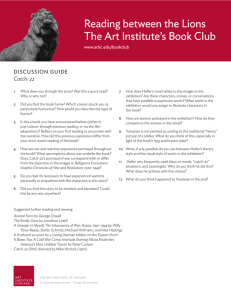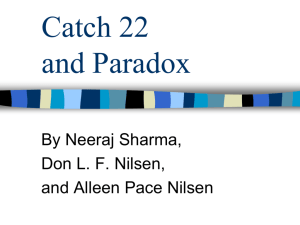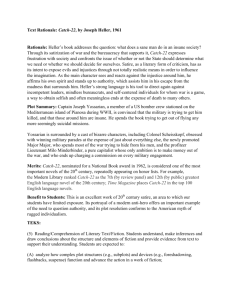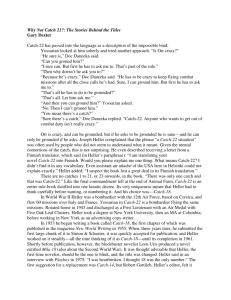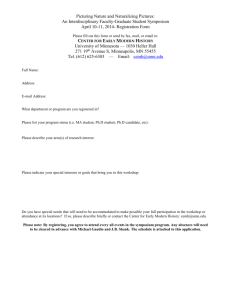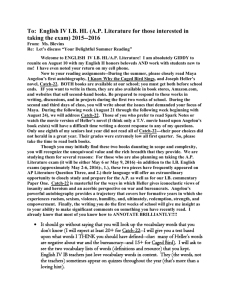File - Asher Dorshimer's Portfolio
advertisement
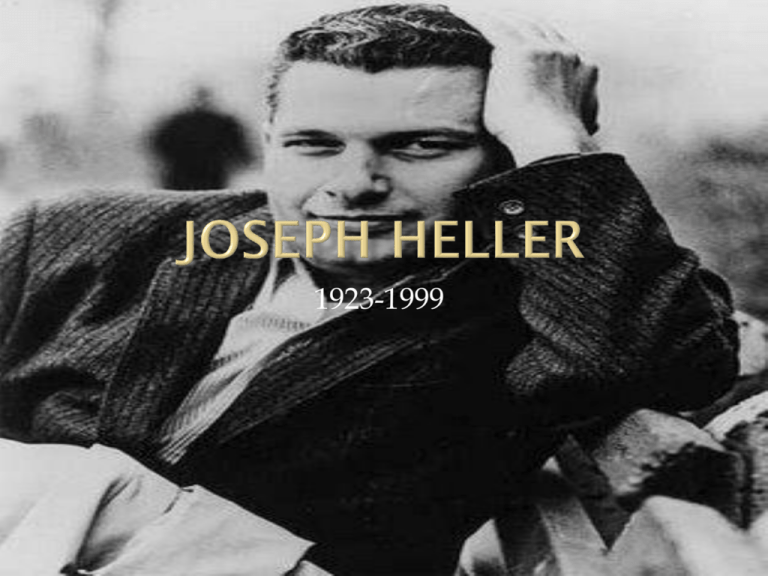
1923-1999 Heller was born in Brooklyn, New York to a family of Russian-Jewish Immigrants. At the very young age of five, his father died after an operation gone wrong. The death of his father profoundly affected Heller and would be later reflected in his writing on the topic of death. Heller was raised by his strong mother and formed a close bound with his older half brother who filled in the role of a father figure for Heller. At the age of ten, Heller gained possession of The Illiad and decided that he would be a writer. After graduation from high school Heller did a variety of jobs from a filing clerk to being a blacksmiths apprentice before enrolling in the United States Army Air force in 1942. He served as a bombardier in a B-25 bomber and did bombing runs in Italy, flying 60 missions and received the air medal among others. His war experiences would ultimately lead him to write Catch-22. After the war Heller married and had two kids and decided to go back to school. He got a bachelor degree at New York University and a masters at Columbia University. He began teaching writing composition at Penn State, before beginning to write first short stories and than novels. It wasn’t until Catch-22 that his fame began to arise. He began to focus his entire career on writing fiction and even attempted to write screenplays for Hollywood. As he published more novels his marriage fell apart and he divorced his wife of 29 years. He suffered a crippling bout of Guillain-Barre syndrome in 1986, which left him paralyzed for months. He recovered with the help of his friends and wrote about the experience. He remarried in 1987 to one of the nurses who attended to him, and continue to write several more novels before suffering a fatal heart attack in 1999. Heller wrote a collection of short stories titled Catch as Catch Can, before moving on to his definitive novel Catch-22 that defined his career. His other notable works are others novels such as Something Happened, a novel about American business, Good as Gold, a novel that explores Jewish life in America, and the sequel to Catch-22, Closing Time. Heller wrote a book about his battle with Guillain-Barre syndrome in No Laughing Matter. He wrote one last novel, Portrait of an Artist, As an Old Man, which was published after his death. Catch-22 was written in 1961, not long after World War two, which Heller served in. Even though Heller had nothing terrible to say about his war years, the basis of the books plot and characters where directly influenced by his personal experiences. People he encountered in his teaching career helped him craft the memorable characters that populate the world of Catch-22 . The novel ‘s stance on the absurdity and horrors of war was one of the first books to come out against war since World War 2. Heller criticized war and the government based on the Korean War , Cold war, and McCarthyism. This was one of the first instances of the county’s anti war feelings which were soon to surface with the Vietnam war just around the corner. “There was only one catch and that was Catch-22, which specified that a concern for one’s own safety in the face of dangers that were real and immediate was the process of a rational mind. Orr was crazy and he could be grounded. All he had to do was ask; and as soon as he did, he would no longer be crazy and would have to fly more missions. Orr would be crazy to fly more missions and sane if he didn’t but if he was sane he had to fly them. If he flew them he was crazy and didn’t have to; but if he didn’t want to he was sane and had to. Yossarian was moved very deeply by the absolute simplicity of this clause of Catch-22 and let out a respectful whistle. “That’s some catch, the Catch-22”, he observed. “It’s the best there is,” Doc Daneeka agreed.” (Heller, 44% Kindle Version) This quote shows the definition of the “catch” in Catch-22 and the impossible situation that Yossarian is in. The only way one can escape war is to die, a commitment that Yossarian will not make. Many of the characters in the novel have their own dilemma to deal with such as Nately winning the love of an unloving prostitute, Major Major Major Major trying to fit in and not stand out, Milo managing his massive black market syndicate that grows exponentially, and Chief White Halfoat from being chased away after oil is always found near him. Heller likes to show the madness of war and proof that ultimately cannot be simply just won. War again was key on Heller crafting this short story, as he likely felt the same feelings returning home as he wrote the story directly after he himself had returned from Italy. Like the man in the story, Heller went through a transformation and his views on love, life, and death were changed. Heller’s faith was almost certainly tested and changed as this short story shows. The man in the story is recovering and constantly contradicting his feelings from solving a possible to saying his true feelings to the woman he loves. Heller shows how people can only truly appreciate something after its gone. The man in the story doesn’t appreciate his wife Anne until he believes she has left him and finally understands he does love her. A man has returned home after serving in the military and is pondering over his new feelings. He continues to infuriate his wife by refusing to get dressed to prepare for guests coming over, telling her that he missed different things when he was gone and now that he is back he realizes nothing is how it use to be from music to his marriage, telling her he isn’t the young attractive boy who married her anymore. He keeps asking her to get him a beer and eventually she leaves the house in anger after he tells her that he believes he doesn’t love her anymore. With her absence her becomes nervous and gets dressed and start formulating a plan to do next. He greets his guests and tries to rush them out only to see his wife has returned with beer, with her happy to see him dressed and finally helping, and he happy to see she has brought home beer. Heller loves to put humor in situations that are unfunny to events that are horrifying. His humor helps show how the characters think and add satirical comments by Heller on topics like war and in this case marriage. "Harry and Edith have been married for five years. If she isn't familiar with the anatomy of the male by this time, then she has been missing a hell of a lot and it is my duty as a friend to enlighten her.“(Heller, PG 4) Heller takes my man dealing with a man facing a marriage that is falling apart and still manages to find ways to through humorous bits that add depth to the characters and make situations appear even more dire when the characters in them fail to realize the significance. Heller likes to show characters inner thoughts by simply having them talk about their believes and feelings. He loves to add dialogue so his characters can interact with one another. The man simply tells both his wife and the reader about his change of feelings and his attempts to lie about his actual feelings to his wife. Dialogue also allows Heller to put in the previously mentioned humor in his stories by having his characters say witty remarks and have comical conversations. "Do you want a divorce?" she asked. "No," he said, "I don't want a divorce. I have been leaning upon you for support too long a time. Psychologically, I am dependent upon you.“ (Heller, PG 4) Heller uses dialouge to show the charectors feelings and intentions and an easy way to through a humorous sentence or two. Heller’s works like to show how characters are changed by their experiences and find it very difficult to make the transition back into their old lives. Using his real life experiences, Heller likes to show how war effects people on a more emotional and psychological level. The man in this story is confronted with these new feelings that make him question why he use to like the things he has and make him question why he deserves to have them. His wife is angered by her husband’s apparent change and leaves. The man also is uncomfortable with being called a hero and is shown to be unhappy that he must again listen to being called a hero. “I don't want to sit in a room filled with people who are all beaming at me as if I were some marvelous mechanical toy, and play the modest hero. I don't want to tell anybody what it was like and smile shyly as they tell me how wonderful I am.“ (Heller, PG 2) The man in the story finally accepts his new status and his true feelings for his wife as he experiences the fear of losing what he loves. Accepting change can be very difficult, and it almost cost the husband his wife. Love and hate go hand in hand in Heller’s take on marriage. The man in the story shows how some don’t appreciate what they have and can become almost selfdestructive, lying to themselves about what they really want. The man in the story missed small things like music and his wife while gone and now that he is back, he begins to almost despise and hate them and lying to himself about what he feels. Some people hate to love in a bizarre way and believe emotion makes them weak. The hates what he has and loves what he doesn’t and it isn’t until he is faced again with the odds of never seeing his wife again force him to sober up. It’s a pessimistic way of looking at modern marriage that certainly feels like a work by Heller who is showing his views on love and hate and how they are important parts in marriage. Despite the fact that Catch-22 is a very different look on war, it still shows the intricate system that the air force used while providing air support in World War 2. The reader gains an understanding of how a the crew does their various functions in the large B-25 from such as the pilot, co-pilot, navigator/bombardier, turret gunner, operator/waist gunner, and tail gunner. Heller shows his knowledge of the B-25, after all he flew 60 missions in one. He also shows the complex system of the officers and flight coordinators and other jobs being conducted for bombing raids to happen. Over 80,000 of American crewmen were killed in the Air War over Europe, so despite Heller claiming his missions weren’t very serious, statistics prove differently. The catch in Catch-22 about insane situations is referenced in other works and used today to describe conundrums that people face in their everyday lives. Now that I have read the book, I can fully appreciate these inside jokes and fully appreciate Heller’s ingenious in cleverly crafting an all encompassing rule that keeps us trapped in our day to day lives, and presents us with tough choices that don’t always have the right answer.
